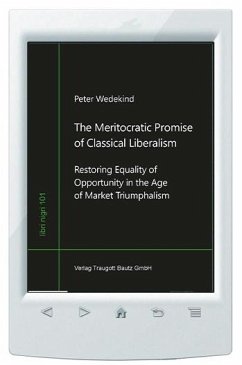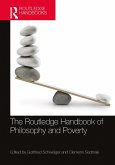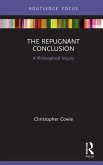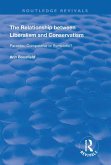In an era of Market Triumphalism, this book follows the quest to address a myriad of prominent socio-economic pathologies in Western democracies - such as skyrocketing financial inequality, marketization, hereditary privileges, as well as dysfunctional types of merit-based justice - without surrendering their liberal foundation altogether in favor of an entirely different political framework. The author argues that classical liberalism should be regarded as a valuable doctrine worth keeping, and that the liberal tradition is not inevitably destined to succumb into the neoliberal and increasingly plutocratic as well as nepotistic manifestation responsible for the growing discontentment with the 'liberal order' during the past approximately four decades. Instead, the meritocratic promise inherent to classical liberalism must be taken more serious as a principle of justice and efficiency which - in turn - should be instrumentalized as an imperative for the provision of substantially greater equality of opportunity. The argument culminates in an advocacy for significantly higher levels of state regulations - for example via taxation to make higher education accessible to all sufficiently talented students independent of their family background - based on the claim that such interventions are justified if they bring about the levelled playing field necessary to a genuine meritocracy. Correspondingly, the author proposes policies more frequently associated with the postulates of social welfare egalitarians, however, he does so exclusively from within the pond of classical liberal principles. Until 2018, Peter Wedekind studied Practical Philosophy of Economics and the Environment as well as Economics/Politics and Philosophy at Kiel University. In 2022, he received his PhD in Political Science with a focus on Political Philosophy at Charles University, Prague. During his studies, he completed several research stays at the University of Richmond and as a Barrande Fellowships scholarship recipient at Montpellier Business School. Today, he serves in the teaching profession at a secondary school in the state of Schleswig-Holstein, Germany. - In einer Ära des Markttriumphalismus' widmet sich dieses Buch dem Versuch, eine Vielzahl prominenter sozioökonomischer Pathologien - darunter exorbitante finanzielle Ungleichheit, Vermarktlichung, herkunftsbedingte Privilegien sowie dysfunktionale Formen von Leistungsgerechtigkeit - in westlichen Demokratien zu adressieren ohne dabei deren liberales Fundament leichtfertig zugunsten einer gänzlich anderen Gesellschaftsblaupause aufzugeben. Der Autor argumentiert dabei, dass klassischer Liberalismus eine erhaltenswerte und reiche Tradition verkörpert, welche nicht zwangsläufig in jener neoliberalen und zunehmend plutokratischen sowie nepotistischen Manifestation verenden muss, die ihr in den vergangenen rund vier Jahrzehnten eine höchst umstrittene Reputation eingebracht hat. Stattdessen sollten die im Liberalismus angelegten meritokratischen Gerechtigkeits- und Effizienzprinzipien zu Ende gedacht und ernstgenommen werden, welche ihrerseits als Imperative für substanziell größere Chancengerechtigkeit instrumentalisiert werden können. Das Argument kulminiert in der Konklusion, dass signifikante staatliche Eingriffe, beispielsweise in Form von Besteuerung zur Förderung von Hochschulbildung unabhängig vom familiären Hintergrund, dann gerechtfertigt sind, wenn sie der Herstellung eines adäquaten Fundaments einer genuinen Verdienstgesellschaft dienlich sind. Der Autor bewirbt damit Policies, welche typischerweise eher mit egalitären Sozial- und Wohlfahrtsstaatstheorien assoziiert werden - tut dies jedoch rein aus dem Ökosystem klassisch liberaler Prinzipien heraus. Peter Wedekind studierte bis 2018 Praktische Philosophie der Wirtschaft und Umwelt sowie als Lehrämtler Wirtschaft/Politik und Philosophie an der Christian-Albrechts-Universität zu Kiel. Bis 2022 promovierte er im Rahmen des Politikwissenschaftsprogramms mit einem Schwerpunkt auf politischer Philosophie an der Karls Universität in Prag, und absolvierte dabei Forschungsaufenthalte an der University of Richmond sowie als Stipendiat des Barrande Fellowships an der Montpellier Business School. Seit dem abgeschlossenen Forschungsdoktorat ist er im Schuldienst des Landes Schleswig-Holstein tätig.
Dieser Download kann aus rechtlichen Gründen nur mit Rechnungsadresse in A, B, BG, CY, CZ, D, DK, EW, E, FIN, F, GR, HR, H, IRL, I, LT, L, LR, M, NL, PL, P, R, S, SLO, SK ausgeliefert werden.









